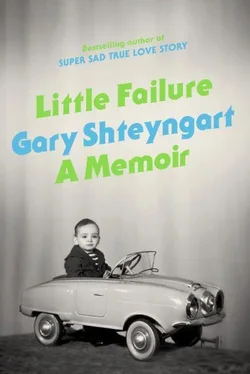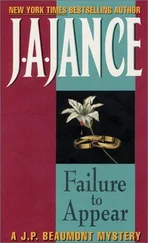Not to mention that after borrowing $9,600 for one floor of 252-67 Sixty-Third Avenue we cannot afford a television, so instead of The Dukes of Hazzard , I turn to the collected works of Anton Chekhov, eight battered volumes of which still sit on my bookshelves. Without television there is absolutely nothing to talk about with any of the children at school. It turns out these little porkers have very little interest in “Gooseberries” or “Lady with Lapdog,” and it is impossible in the early 1980s to hear a sentence spoken by a child without an allusion to something shown on TV.
“NEEEEERD!” the children scream whenever I try to welcome them into my inner life.
And so the Red Nerd finds itself doubly handicapped, living in a world where it speaks neither the actual language, English, nor the second and almost just as important language, television. For most of its American childhood it will have the wretched sensation that fin de siècle Yalta with its idle, beautiful women and conflicted, lecherous men lies somewhere behind the Toys“ R”Us superstore and the multiplex.
And now let me show you my private quarters. The garden apartment has three bedrooms, which is three bedrooms more than what we had when we got off the Alitalia jet at JFK just two years ago. USA! USA! I suppose. Most Russians do not breed well in captivity, and anyway my parents do not seem to like each other very much, so I have no siblings. This works out well by me. From a school essay entitled “I’m Worth Writing About”: “I like my position in the family. If I had a bigger brother he would boss me around call me names and punch me and kick me and beat me up.”
My parents have taken the big bedroom, where we lie together in their giant shiny mahogany bed as one on weekends and they try to grab at my circumcised penis to see how it has turned out and if it has grown in accordance with the All-Soviet Guide to Boys’ Development. “Dai posmotret’!” they shout. Let us see it! What are you ashamed of? I’m twisting away from them, clutching at my goods, filled to the brim with that stupid new American word: privacy . But, also, I have to say, I am excited and happy that they take such an interest in me, even though I know from SSSQ that nobody should touch my zain . This much has been explained to us somewhere between Leviticus and Prophets.
And so, privacy. Because there are three bedrooms, and my parents are very pleased with having even one, I am handed over the remaining two. This is also a statement on their part: They love me so much that everything that is in excess to their meager possessions is automatically mine. I would estimate their own entertainment budget during the fiscal years 1979–1985 at about twenty dollars a year, mostly hooks for my father’s fishing stick.
My first bedroom, formerly the apartment’s dining room, covered entirely in cheap wood paneling, is given over to my folding couch, which is itself draped in velvety green-and-yellow stripes, oh-so-soft to the touch. When erect, the couch feels like it could belong in a corporate office of the famous International Business Machines, and when folded open, it feels luxurious beyond belief. Only now do I realize that, minus the polka dots, the couch has the same striped color scheme as the singular shirt I brought with me from Leningrad. Next to the couch is a typewriter stand, and on the stand is an IBM Selectric typewriter that my mother has liberated from her place of work. At first I am not sure what to do with it, but I know that holding the font ball labeled COURIER 72 is somehow important, and I hold it in both of my hands for quite a while. Between my Courier ball and the All-Soviet Guide to Boys’ Development there is a terrible chasm that will take half a lifetime to fill.
On the other side of the couch is the glass-and-mahogany bookcase that is the focal point of every Russian household. This kind of unit usually goes in the living room where visitors can appraise their hosts and take notes on their intellectual deficiencies. My parents aren’t telling me to become a writer — everyone knows that immigrant children have to go into law, medicine, or maybe that strange new category known only as “computer”—but placing the bookcase in my room sends the unmistakable message that I am our family’s future and that I have to be the best of the best. Which I will be, Mama and Papa, I swear .
The bookcase contains the collected works of Anton Chekhov in eight dark blue volumes with the author’s seagull-like signature across every volume’s cover, and most of the collected works of Tolstoy, Dostoyevsky, and Pushkin. In front of the Russian greats stands a siddur (the Jewish daily prayer book), enclosed in a plastic case and coated with fake silver and fake emeralds. It is written in a language none of us understands, but it is so holy that it blocks out the Pushkin that my parents have all but committed to memory. Beneath the siddur, on the inferior shelves, is the small but growing collection of American children’s books that I am now capable of reading. There is the book on how Harriet “Moses” Tubman freed the black people from Maryland, there is a short history of George Washington (how handsome he looks astride his white mare, a real amerikanets !), and a book called The Boy from the UFO . An unhappy white boy, Barney, who lives with his foster parents meets an alien boy in his backyard and agrees to go back to his home planet. When he finds out he’ll never see his foster parents again, he learns to love them. On the cover is Barney, also very handsome and American in his pretty pajamas on a rooftop that is the personal property of his foster parents (just like we own our roof now!), and a spherical metal container, the UFO, floats promisingly in front of him. I don’t know why, but reading this book makes me cry at night.
Opposite the bed is the closet in which the Lightman with only the white sclera for eyes shares his quarters with my shirt, a V-neck sweater, and a pair of yellowish corduroy pants, part of my Stinky Russian Bear ensemble at SSSQ, wide waled in a style that will make a confusing comeback when I enroll at Oberlin College less than a decade later.
Lest the reader get the wrong impression, let me say now that I am agog with Bedroom Number 1. There is so much happiness here. This is my first stab at keeping and maintaining my own space, even if my father will saunter in without knocking to pick up Dostoyevsky’s The Insulted and Humiliated from the bookshelves, and my mother will come over regularly to pet me and make sure I am still alive.
And then, as if that’s not enough, my kingdom extends to Bedroom Number 2. We do not have enough money to furnish this bedroom, but this is when the amazing American curb — the land of miracles — will provide us with another couch, of coarse plaid, upon which we will stick an even coarser red carpet, the kind that used to hang on the wall above my Culture Couch in Leningrad. Eventually we will find a little black-and-white Zenith television in the trash can outside our building, and that will find its pride of place, and when I will grow even older and have access to a Sanyo AM/FM Stereo Cassette Player with Headphones and Anti-Rolling Mechanism I will sit on the coarse Russian carpet covering the coarse American couch and, while listening to Annie Lennox lamenting the weather in “Here Comes the Rain Again,” brood in the singular odorous way of a boy sinking into his teenage years.

Outside our storm windows there is also a new world. Deepdale Gardens must have once been a pretty redbrick maze of two-story buildings and interlocking parking garages, but by 1981 it has all faded to a brownish color. This red-fading-into-brown defines Queens for me; it is quiet and melancholy and postsuccessful, vaguely British in its disposition. But at the time all I know is that there are pathways and roundabouts on which I can ride my shitty used bike, and all of this territory belongs to the cooperative and, hence, partly, to me. In fact, there are signs everywhere attesting to the private-property nature of Deepdale Gardens — meaning It is our complex, so you keep out, mister .
Читать дальше













